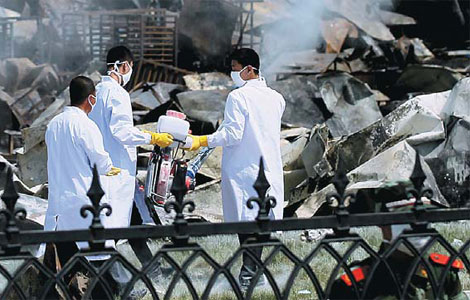Sydney to adopt driverless trains
Updated: 2013-06-06 15:03
(Xinhua)
|
|||||||||||
SYDNEY - Sydney's upcoming North West Rail Link system will be piloted by driverless trains in an Australian first, the NSW government announced Thursday.
The move has been welcomed by Infrastructure Partnerships Australia as a massive leap forward for Australian rail services.
According to Transport for NSW, automated systems optimise the running time of trains and increase the average speed of the system, allowing more trains to operate closer together and reducing the time it takes a train to slow down at stations.
"Fully-automated train technology has been in use around the world for 30 years, keeping customers safe and ensuring rapid transit systems like the one we are building operate fast and efficiently, while catering for future growth," said Minister for Transport Gladys Berejiklian.
"Automated systems deliver safe, efficient and reliable train services in global cities like London and Barcelona, with even higher levels of automation in Paris, Singapore and Dubai -- and now Sydney will also finally have its own world-class network.
"This technology is focused on safety and reliability -- there's no point building a 21st century system with 20th century technology in it," she added.
The driverless trains will be monitored by a team of controllers at a control center.
The North West Rail Link promises to deliver a train at least every five minutes during peak times, expanding capacity to up to 30 trains an hour on the wider network.
The 23 kilometer rail link will connect Sydney's western suburbs at Rouse Hill to Chatswood in the north, and will be run by a private operator.
"Over the past two years we have been talking closely with the community and industry experts about the North West Rail Link and the feedback has been clear. Sydney wants -- and needs -- a modern, fast, reliable rail network and this is the best way to deliver it, " Berejiklian said.
Two potential providers have until the end of 2013 to finalise their proposals, with the contract awarded in the second half of next year.
Related Stories
Sydney's oldest barmaid still working at 91 2013-06-01 08:12
Beauty of Tibet art show opens in Sydney 2013-05-31 21:01
Mahjong players promote tour of Sydney Harbour Bridge 2013-05-15 14:39
Fine food championships begin in Sydney 2013-04-22 13:57
Wax figures of celebrities placed at Sydney Harbor 2013-04-17 16:06
Colorful Sydney 2013-02-27 11:17
Today's Top News
China calls for dialogue after EU solar panel duties
China's middle class emerges, to spend more
China to build research center for Arctic region
Analysis puts face on 'cute' distant cousin
Leaders promise to improve China's air quality
Li urges foreign firms to increase spending
Obama taps Rice as national security advisor
China launches EU wine probe after solar tariffs
Hot Topics
Lunar probe , China growth forecasts, Emission rules get tougher, China seen through 'colored lens', International board,
Editor's Picks

|

|

|

|

|

|





